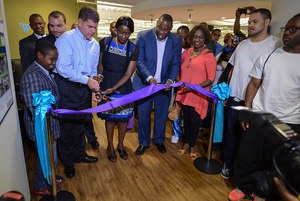
Denver, Louisville, Boston, St. Louis and Camden, N.J. will use Choice Neighborhoods grants to leverage millions and create mixed income developments.
The U.S. Department of Housing and Urban Development (HUD) has awarded Denver, Colo., Louisville, Ky., Boston, Mass., St. Louis, Mo., and Camden, N.J. the final Choice Neighborhoods Initiative grants of 2016. The awards total more than $132 million, with most cities receiving about $30 million while the city of Camden received $13 million for its project.
Choice Neighborhoods targets reinvestment in neighborhoods of concentrated poverty with the goal of revitalizing distressed public housing to create sustainable, mixed-income housing.
The Promise of Mixed Income Development
According to the HUD announcement, the five cities will replace a total of 1,853 severely distressed public housing units with nearly 3,700 new mixed-income, mixed-use housing units as part of an overall effort to revitalize specific neighborhoods. With the grants, the winning cities are leveraging an additional $636 million through public-private partnerships.
In essence, for every $1 in Choice Neighborhoods funding, the cities and their partners have received an additional $5 in partnership funding. HUD also indicated that the specific plans project overall investments in these neighborhoods upwards of $3 billion.
"What we do today will leverage private investment and bear fruit for generations of families looking for an opportunity to thrive in neighborhoods that are connected to the economic and social fabric of their communities,” said Julian Castro, HUD secretary, when he announced the grant awards in St. Louis.
Targeting Distressed Neighborhoods
HUD announced the grants from St. Louis’s Preservation Square, north of downtown, where redevelopment will take place. The neighborhood is part of the St. Louis Promise Zone designated in 2015. Promise Zones receive technical assistance and other support from the federal government to help them better compete for grants.
In June, the National Geospatial-Intelligence Agency also selected the area to build its new western headquarters . St. Louis Mayor Francis Slay cited the importance of the agency’s site selection to the distressed Near North Side neighborhood that includes the housing project.
“It’s going to be impactful for the neighborhood it’s in. It’s going to be impactful for the surrounding area,” he said.
Collaborative Redevelopment
The winning cities previously received Choice Neighborhoods Planning grants. After two years of local planning, the latest grant awards spur the investments needed to make each city’s project a reality.
The program requires that local leaders, residents and stakeholders, including public housing authorities, cities, schools, police, business owners, nonprofits and private developers, develop a collaborative transformation plan. Boston stakeholders have actually been working on the Whittier Choice Neighborhood Initiative since its Choice Neighborhoods Planning grant was awarded in 2012.
However, some Boston stakeholders reject the project proposed in the grant. Led by former state senator Dianne Wilkerson, Freeze Frame Black Boston, an initiative of the Black Economic Council of Massachusetts and the Massachusetts Black Lawyers Association , wrote to public officials asking to reject or delay the grant to enable local people more involvement in the project’s construction and design. The letter criticized the city for a lack of diversity in management and hiring for major projects like this one, according to a Boston Globe columnist.
About Choice Neighborhood Funding
HUD received 34 applications for the latest round of Choice Neighborhoods Implementation Grants. The program has awarded more than $633 million since 2011. Choice expands on Hope VI, a long-running HUD program from the 1990s that seeks to redevelop distressed housing projects and the neighborhoods around them.
Download the winning Choice Neighborhoods project summaries from HUD’s website.
Copyright © 2025 GovGrantsHelp.com. All rights reserved.
